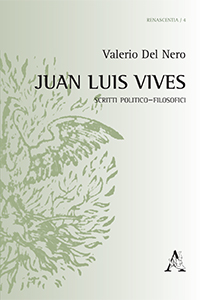Neo-Latin News
Juan Luis Vives: Scritti politico-filosofici. Introduction, Italian translation, and notes by Valerio del Nero.
Roma: Aracne Editrice, 2020. Series ‘Renascentia. Studi e opere di storia della filosofia del Rinascimento 4’. 384 pp. €22,00.
Roma: Aracne Editrice, 2020. Series ‘Renascentia. Studi e opere di storia della filosofia del Rinascimento 4’. 384 pp. €22,00.
These Latin socio-political writings of Juan Luis Vives from the tumultuous years 1522-1529 deserve wider attention. Anxiety over vicious power struggles among European princes; arguments for pacifist diplomacy and its limitations; reflections on how to come to terms with the expanding Ottoman Empire; urgent pleas to the Pope for leadership in healing the political and religious fractures of Europe; and crystallization of the idea of Europe, a distinctively Christian Europe—these are the concerns of the works presented here in Italian translation by del Nero, a noted scholar of the Spanish humanist. To this English-speaking reviewer, del Nero’s translation is fluid, accurate, and accessible. Three letters open the ensemble. The first, to Pope Adrian VI, De Europae statu ac tumultibus, hopes the new pontiff is the right one to conciliate warring European powers and bring Christianity together. Next come two epistles to Henry VIII, on generous treatment of the defeated French king and on the qualities of a just princely rule. Fourth is Vives’s Lucianesque underworld satire, De Europae dissidiis et bello Turcico, in the form of a dialogue featuring Minos, the judge of the dead, Tiresias, the ancient prophet, and Scipio Africanus, conqueror of Hannibal. A glut of army casualties piling up at the Styx, mostly from dynastic battles in Italy, leads to Scipio’s ringing call for an end to intra-European squabbles and an aggressive all-out war against the Turks. Del Nero sees Vives’s attitude to the Turkish question as complex, even contradictory; in his view Vives rejects any justification for a just war, even vis-à-vis the Turks, and expresses the pacifist line while still recognizing the Turkish threat to Europe and Christianity. Del Nero reads in Vives a strategy of containment without rejection of military options and a hope for rapprochement between the two worlds, idealistically inspired by the conviction that we must love the Turks because they share our humanity. [...]









